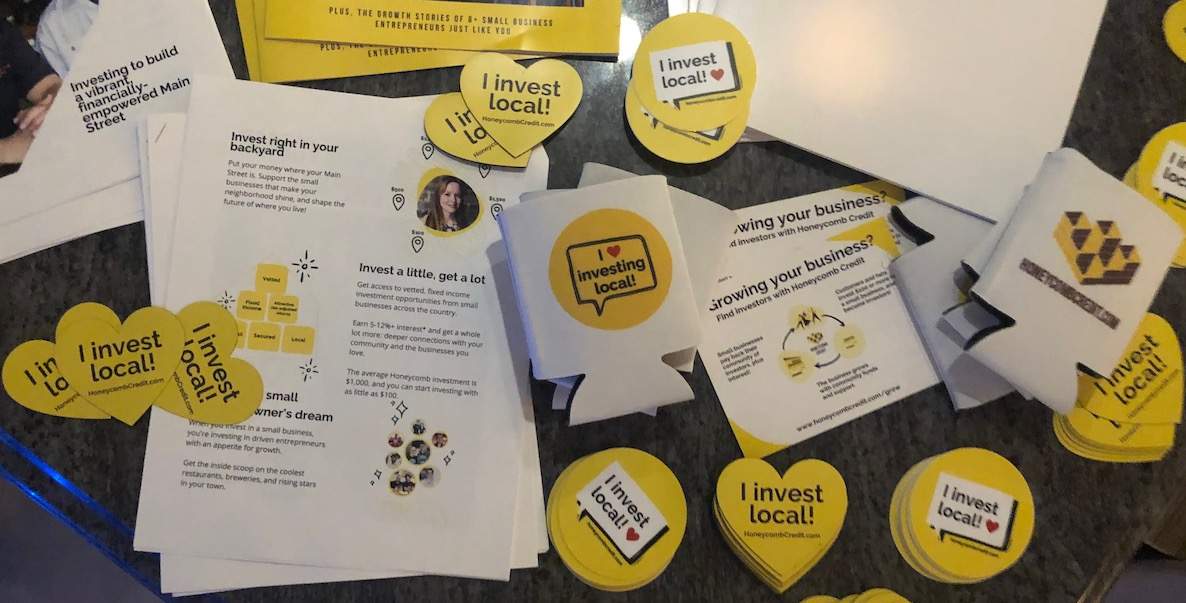When George Cook and Ken Martin expanded their business, Honeycomb Credit, from Pittsburgh to Philadelphia in early 2020, they envisioned working to build relationships with Philly’s many small businesses.
Their platform helps small business owners connect with investors and crowdfund loans. When they launched in 2018, Honeycomb was very involved with the Pittsburgh businesses they worked with, assigning each a local community campaign manager who created social media posts and helped them raise money for the loans.
They wanted to build a similar infrastructure in Philly, where on-the-ground employees would work to build relationships with entrepreneurs, help them consolidate their debt, grow or pivot their business models.
That was back in February 2020 — just before Covid made it difficult to make in-person connections with, well, anyone. On top of that, the need for Honeycomb’s services exploded, as small businesses across the country struggled amid the pandemic. “We started to see inbound traffic from all over the country because a lot of other lenders had retreated from the market,” Cook says.
So, they pivoted. They opened up the platform, and businesses from Maine to Hawaii soon launched campaigns with Honeycomb’s help. To date, the company has completed 260 campaigns in 27 different states, helping small businesses with everything from refinancing loans and buying furniture for a second location to purchasing a cucumber-slicing machine for a pickle company.
Now, with a return to something that resembles normalcy, Honeycomb has pivoted again. They want to focus on core, geographic markets where they can build a strong, in-person presence — and Philly is at the top of their list.
Last year, Honeycomb helped South Philly restaurateur Adam Volk launch a high-profile, well over $100,000 fundraising campaign after a water main break delayed the opening of his new business. On the heels of that success, Honeycomb has partnered with the social impact organization Spring Point Partners to match investments raised for qualifying local businesses.
Recreating a community lending model
Cook and Martin founded Honeycomb Credit after noticing that big banks had become hesitant to issue loans to small businesses in the wake of the Great Recession. That trend has continued to today: Only 31 percent of small business loan applicants received the funds they needed in 2021, compared to 51 percent in 2019, according to the Federal Reserve’s “Small Business Credit Survey: 2022 Report on Employer Firms.”
In the past, small, community-owned banks would step in to support small businesses when funds from big banks weren’t available. Local banks are more likely to take a risk on a small business, because their owners often know the people applying for loans and they believe in the benefits they’ve brought to the community. Over the last 30 years or so, however, the number of small banks in the U.S. has shrunk. Between 1984 and 2020, the number of community banks declined by 70 percent nationally, according to the Federal Reserve Bank of St. Louis.
Honeycomb wants to focus on core, geographic markets where they can build a strong, in-person presence — and Philly is at the top of their list.
Cook, who serves as CEO of Honeycomb Credit, grew up in the world of small banks. His family has owned and operated the Somerset Trust Company in Somerset, PA for over 130 years. He saw small, local businesses juggling mountains of credit card debt, struggling to get the capital they needed to survive. Martin, meanwhile, was an investment banker turned small business owner who was experiencing some of the issues Cook was observing.
“We said, ‘How can we bring that community lending model back, but in a tech-enabled, scalable way?’” Cook says. “And that’s how we came to Honeycomb.”
They knew they wanted to create a platform that could help them take advantage of local investors who knew and believed in local business models. They started thinking about bees, how they all come together in a hive to support a common good. That’s how they got to Honeycomb Credit, a business that would allow community investors to support the small businesses that are pillars in their communities.
The process of starting a campaign is simple. Small businesses that have been open for at least six months pay $250 to list their cause on Honeycomb’s website. The platform then connects the owners to a community campaign manager, who creates social media posts, videos and other marketing materials.
Once a campaign is on the site, investors can donate as little as $100, and they receive monthly payouts with an interest rate between 8 and 13.75 percent. Honeycomb Credit takes between six to eight percent of whatever is raised to support its operating expenses. Businesses can raise between $25,000 and $250,000.
Saving a small business
One of Honeycomb’s first efforts to re-engage in Philly came last year, when Redcrest Fried Chicken owner Adam Volk was expanding his East Passyunk takeout operation into a full-service restaurant in Queen Village. During construction, however, a water main at 6th and Bainbridge streets burst, delaying the opening of Redcrest Kitchen — and sinking Volk into unexpected debt.
For Volk, the support of Honeycomb’s campaign manager was key to his fundraising success. “She just took everything off my plate for the campaign,” Volk says of his campaign manager. “They know exactly what to say to help raise that money; they know how to phrase the posts.”
Before, when he was running a GoFundMe to try to cover the costs of repairing the damage and buying new equipment, he had to get the word out — on top of trying to manage the construction happening at Redcrest — and being a new father. Volk didn’t have time to try to create videos or write clever social media posts, and the GoFundMe he launched raised just over $8,000 of its $50,000 goal.
His Honeycomb Credit campaign raised more than 13 times that.

In fact, Volk’s campaign allowed him to cover operating costs, purchase new equipment and make repairs that weren’t covered by his landlord’s insurance. Redcrest Kitchen is now open and serving smoked short ribs, wild-caught halibut and other Instagram-worthy dishes.
So far, Honeycomb has completed just five campaigns in the city, but Redcrest’s campaign, which garnered a ton of media attention, has helped other businesses find out about the platform and its potential for helping them access the types of small loans that may be inaccessible from big banks. “We’ve been welcomed with open arms into Philadelphia,” Cook says. “The local small business community has been so warm and open and embracing.”
Honeycomb is also finalizing a partnership with the social impact organization Spring Point Partners to match investments raised for qualifying local businesses, while also tapping into Spring Point’s network of local entrepreneurs, nonprofits and small businesses to get the word out and build connections in the city.
“We’re hoping that this will really provide a much-needed source of support to the businesses in Philly,” says Margot Kane, chief investment officer with Spring Point.
Sixty-four percent of Honeycomb’s campaigns have been for women-owned businesses; 51 percent are minority-owned, and 34 percent are based in low to moderate income communities.
Philly businesses in general have experienced modest recovery since the pandemic began in 2020, Pew Charitable Trusts has found, but the improvement hasn’t been evenly distributed. Minority-owned businesses and those in diverse neighborhoods are more likely to be struggling with the aftershocks of the pandemic.
Honeycomb has a history of helping drive investments to minority-owned businesses and those in low-to-middle-income neighborhoods. Sixty-four percent of their campaigns have been for women-owned businesses, 51 percent are minority-owned, and 34 percent are based in low to moderate-income communities.
“They’re retail businesses, not like tech startups, and they’re really focused on serving their communities,” says Spring Point Partners’ Kane. “They provide essential services and products and they make a neighborhood and the community feel vibrant, and provide points of connection as well as local employment.”
Cook declined to share revenue or profitability figures for Honeycomb Credit; he says that the business is growing quickly. He plans to grow the company from 15 employees to 18 by March to help support its growth and its expansion in Philly.
“People love investing in their local businesses because they know those local businesses,” Cook says.
![]() MORE BUSINESS FOR GOOD FROM THE CITIZEN
MORE BUSINESS FOR GOOD FROM THE CITIZEN
Marketing materials from Honeycomb Credit.



